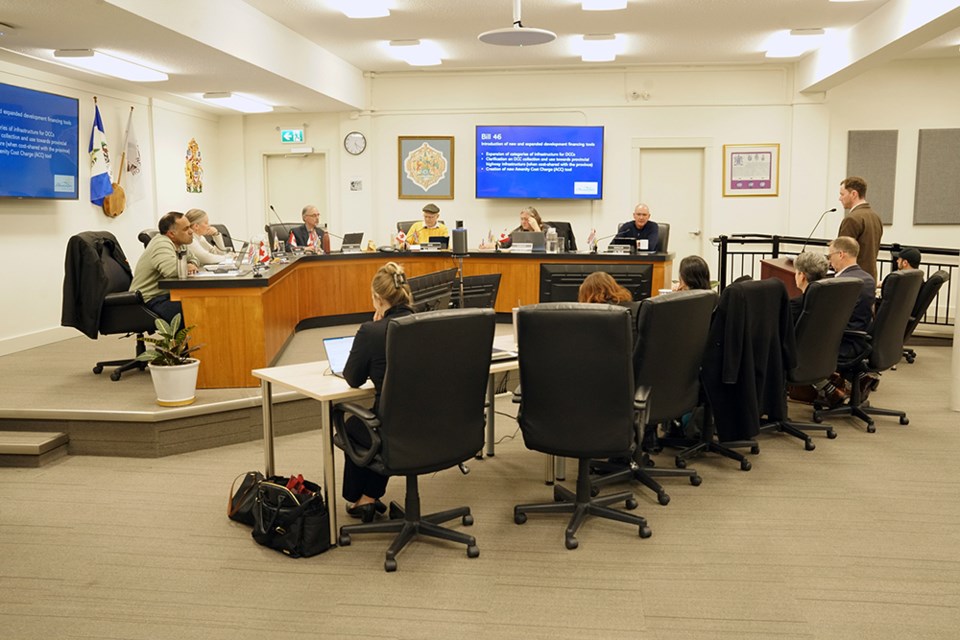City of Powell River councillors were provided an overview of the provincial government’s Bills 44, 46 and 47, all of which deal with housing statutes.
At the April 2 committee of the whole meeting, director of planning services Jason Gow outlined the legislation and the implications it would have on municipalities.
“On November 29 of last year, the legislative assembly of BC passed Bills 44, 46 and 47, forming part of the province’s homes for people action plan and it is aimed at achieving more small-scale, multi-unit housing in land use zones that would otherwise be restricted to single family homes or duplexes,” said Gow. “There are a variety of bylaw amendments and policy updates required to meet the legislative changes.”
Gow said Bill 44, referred to as the Housing Statutes (Residential Development) Amendment Act, amended the Local Government Act to eliminate public hearing processes associated with residential development applications that are in alignment with the city’s sustainable official community plan. He said the prohibition on holding public hearings also extends to bylaw amendments undertaken to comply with the new small-scale multi-unit housing legislation.
“This means that any bylaws that come forward to be amended would be prohibited from holding a public hearing,” said Gow.”
He said in relation to establishing minimum housing density, the province’s position is that the detached single-family houses are financially out of reach for much of the population, yet the majority of local government zoning regulations exclusively permit single-family detached homes.
“Bill 44 establishes minimum housing densities that a local government must permit on the majority of their single-family or duplex lots to facilitate the development of more small-scale multi-unit housing,” said Gow. “The province believes that ultimately, this will provide more housing that is more affordable for more people.
“To comply with Bill 44, the city is also required to produce an interim housing needs report, updating the existing housing needs report. It needs to be adopted by January 1, 2025. This interim report will have 20-year housing needs projections included. Once these 20-year housing numbers are available, staff will analyze the existing sustainable official community plan and zoning bylaws as to whether they already adequately accommodate future housing needs.”
Bylaw alignment
Gow said if not, proposed amendments to both bylaws will align with the interim housing needs report that will come before council for consideration and adoption prior to the end of next year.”
Gow said Bill 46, the Housing Statutes (Development Financing) Amendment Act, introduces new and expanded financing tools, which are anticipated to impact how local governments plan for and finance developments in their jurisdictions. He said this includes an expansion of the categories of infrastructure for which development cost charges (DCC) can be collected, including capital expenditures on solid waste and recycling, fire protection, and police facilities.
“The implications of Bill 46 will likely require the DCC bylaw to be updated to consider what impact the small-scale, multi-unit housing density may have on infrastructure,” said Gow.
Bill 47, which is the Housing Statutes (Transit Oriented Development) Amendment Act, does not apply to the city, said Gow. The province did not identify any part of the city as a transit-oriented area as nowhere in the community meets the minimum transit service requirement, according to Gow.
Gow said under Bill 44, the deadline for updating the zoning bylaw is June 30. He said the city is waiting on housing needs methodology from the province to complete the interim housing needs report.
“Following that, it is expected that the complementary official community plan and zoning bylaw updates to reflect the updated housing needs will come forward for council’s consideration and adoption by the end of 2025,” said Gow.
Mayor Ron Woznow said the last housing needs study indicates that Powell River has a significant shortage of housing.
“We have not made much progress in addressing that significant shortage,” added Woznow. “With this new bill, do you anticipate that it will be more onerous to get developers to help meet the needs of housing in Powell River because of additional charges?”
Housing targets
Gow said he doesn’t anticipate a lot of changes in the community with Bill 44. He said additional charges were not being added to DCCs, public hearings were being removed, and a zoning amendment process was also being removed for anyone trying to achieve four units. He added that the city is almost meeting housing targets stated in a housing report, largely due to the apartment complex development that is happening in the city.
“In some ways, we are actually doing quite well in terms of meeting our housing needs,” said Gow. “There are some areas we are missing, and that would include a range of affordable housing, including rentals and for purchase.”
Join the Peak's email list for the top headlines right in your inbox Monday to Friday.



